Seven members of the Mpophomeni Conservation Group visited Enaleni Farm recently. Enaleni is an agro-ecological mixed farm – a place of abundance.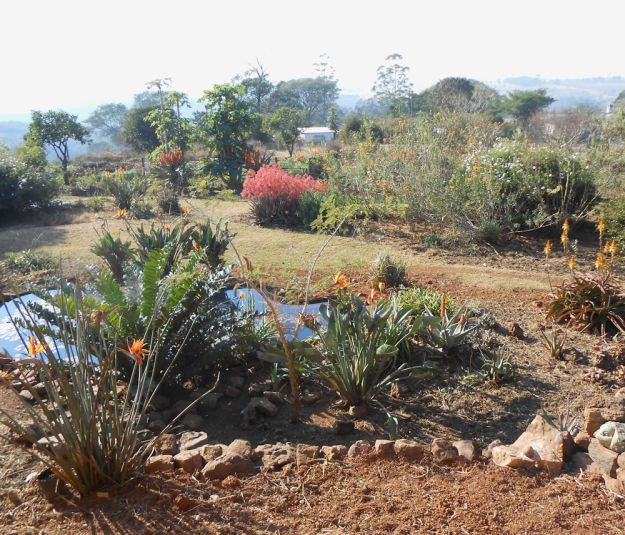
At Enaleni, Richard Haigh and Dave Brennan, grow most of their food. All the pulses, herbs, fruit and vegetables they need and much of the maize. The maize variety is heirloom. It is called ugati gati – traditional Zulu red maize. While Enaleni farm is a small operation – it is BIG in terms of animal care and compassion. All the rare and primitive breeds of animals, birds and vegetables mean they are making a big contribution to food diversity too. Richard takes great joy in celebrating the uniqueness of our food heritage – particularly Zulu culture – and farming with hardy ‘indigenous’ breeds which have adapted to tough African conditions.
The idea of the workshop, funded by N3TC, was to inspire the Mpophomeni Conservation Group to add value to the food they grow already, to learn how to keep money flowing in the community, and produce food that neighbours would like to buy and which is much healthier than store bought alternatives.
The day included with a farm tour – visiting the permaculture veggie garden to gather ingredients for lunch.
They also visited the Zulu sheep, dairy cows, Colebrook pigs, indigenous fowls, and rabbits. This was animal lover, Penelope Malinga’s, favourite part of the day. “Although their destiny is to be eaten, at least their lives are worthwhile. The spotted pigs were adorable.”
At Enaleni they grow orchids too – everyone was amazed at the beautiful blooms and incredible colours. “I have never seen such flowers,” said Tutu Zuma, “or such beautiful chickens.”
As most of the group are using low energy cooking options, harvesting water and aiming at sustainable lifestyles, they were interested in the alternate infrastructure which Enaleni had installed, including a solar water pump. “It was a great day to learn and see different things, feeding my brain with more knowledge. One thing I really liked was learning new skills by action.” commented Tutu.
This is what they made: real bread, pasta (cannelloni), yoghurt cake, cordial, mayonnaise, butter, bottled guavas, rhubarb and apple crumble and a rhubarb relish.
These recipes are tried and tested on the farm and are made regularly. Richard pointed out that the method of making is as important as the ingredients. “Don’t cook in a hurry, take your time and enjoy the process of preserving and transforming food.” Everyone took home a set of notes. “Everyone needs bread and most people dig mayo,” said Penelope – looking forward to trying out her new talents.
They stuffed the cannelloni with spinach and cheese for lunch. Richard shared plenty of tips and anecdotes throughout the day “We started off making pasta with a hand pasta machine that broke the first time we used it. In Italy we witnessed people hand rolling pasta with a rolling pin, needless to say we now only ever hand roll our pasta. The trick with pasta is in the method. It’s all a ‘feel’ thing given that eggs are not equal in size and flour varies. We use a quality stone ground flour and fresh farm eggs.”
Richard’s advice for bottling surplus produce: “The essential rule with bottling is hygiene and hotness at the time of bottling and focus. If you have a mobile phone turn it off or better still throw it away. Make sure that the bottles are washed in hot soapy water and placed in the oven for 20minutes at 100o C or boiled for 10 minutes. Always use new lids and never plastic lids if you want to keep what you have bottled for several months. Bottle only when bottles are hot and add boiling water to lids just before screwing them on. Never add cold ingredients to a hot bottle. Use stainless steel spoons and stirrers. We keep some bottled produce for 2 even 3 years successfully. Store in a dark place if you want to keep what you have bottled for a longer time in a cool area.”
While everyone was squeezing oranges, kneading dough and slicing fruit, there was ample time for discussion about nutrition. Richard explained the E numbers on food labels – the colourants and preservatives and other additives in processed food. Many people do not read the labels on the food they buy and they do not know what is in the food they eat. These things are generally very bad for your health. They are added by food companies to make food look nicer, last longer and taste better. “Yoh, today was one of the most special days of my life” commented Ayanda Lipheyana, “I will never forget this awesome experience. I enjoyed every minute, but like making the cordial juice the most.”
Richard Haigh also had a good day. “What a nice group to work with – energetic doers and all so appreciative. We had a busy day to say the least. I’ve asked them to please implement their new skills within 14 days and 7 days if possible, as it is well known that unless there is practice within two weeks, skills are often forgotten.” Nathi Adam was impressed at how healthy and simple to prepare the food was. “I had an amazing time at Enaleni, I have already made cordial and prepared spinach the Enaleni way.”
Tutu got stuck in right away too “I have made cordial, baked a bread, cooked spinach with cheese and turned rhubarb in my garden into a relish for my family. I will never buy butter again, now that I know how to make it. I am starting to be a friend to my kitchen!” she reported after a couple of days. Thembilihle Mchunu had made some delicious cakes for her family. “I am so proud to be one of the lucky people chosen to attend this workshop.” She said.
“We were treated like kings and queens,” concludes Ntombenhle Mtambo, “we will treasure everything we learnt this day and teach others. Richard and Dave are heroes – they have planned everything on the farm with love and care and now they have it all. I wish one day to copy their example, or at least work with other people who have a farm like that.” Ntombenhle was delighted to be able to try her hand at bottle feeding a little lamb.
Before returning home, everyone sat down to a delicious wholesome lunch including the food they had just made. Soon, they will gather a few neighbours who were not able to attend the workshop, to share their new skills and knowledge and bake a batch of real bread to celebrate!
This programme is part of the Midlands Conservancies Forum’s Building Resilient Communities Project which is funded by N3Toll Concession.




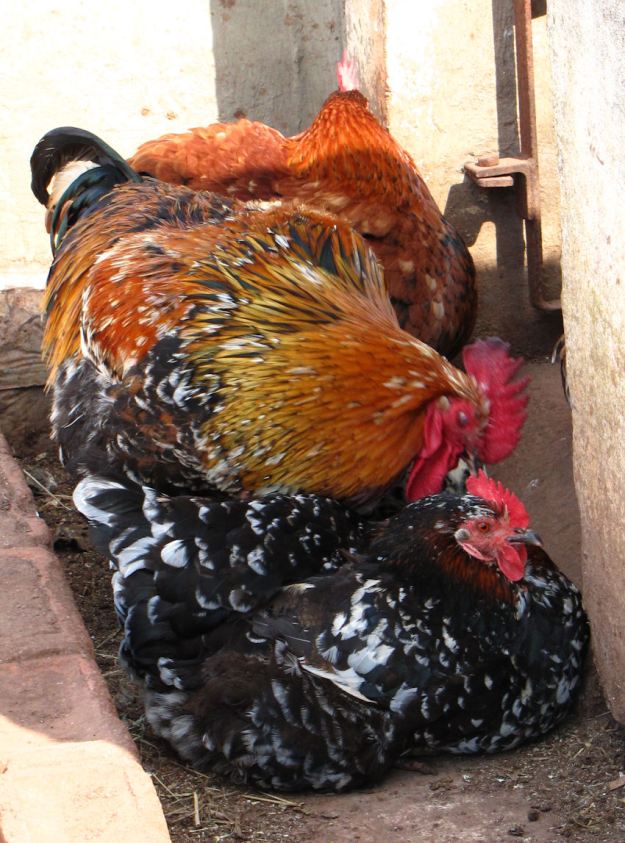

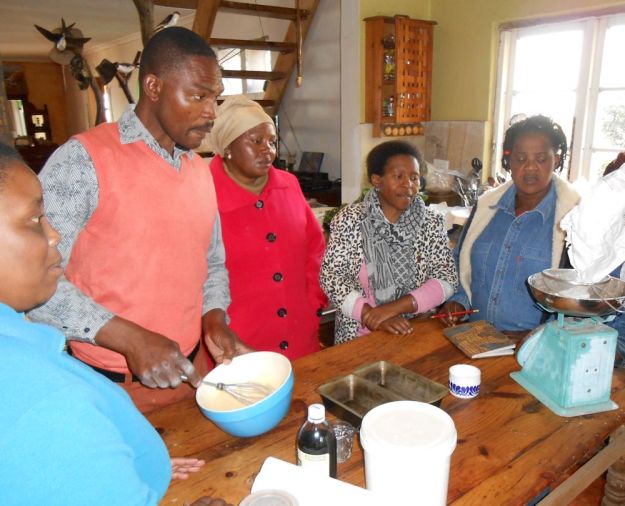




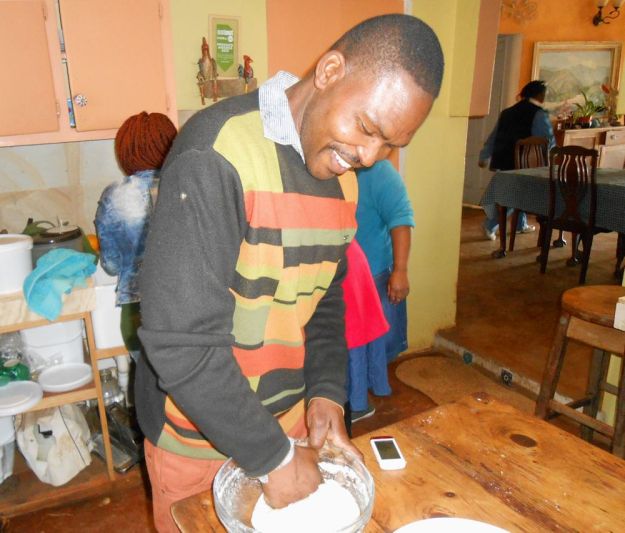

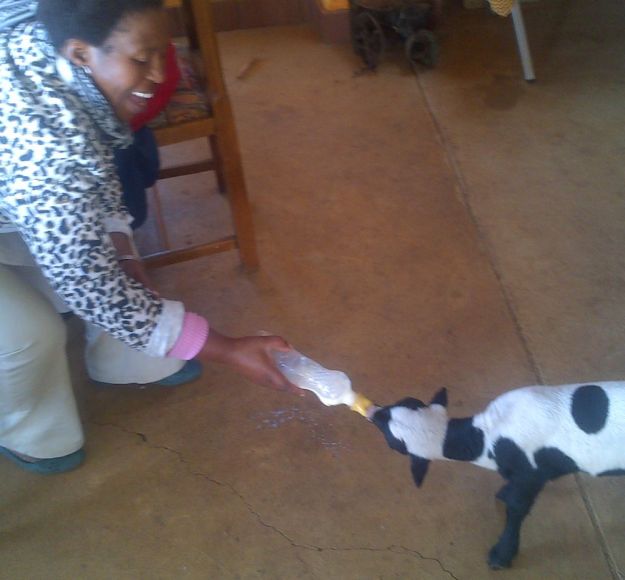


A beautiful blog post Nikki – makes me want to get moving !!
LikeLike
Hi Nikki
Thanks for this – loved it! I have lots of ugati gati mielies in a basket on display, in my sitting room, if ever you want some – they are so pretty!
Where is Enaleni Farm?
Lol Sarah x
LikeLike
Hi Sarah, Enaleni is out on the way to Umlaas Road. look them up http://www.enalenifarm.co.za I have a few stories about them on my blog if you keen to read: http://plantabundance.wordpress.com/2011/09/04/enaleni/ and http://plantabundance.wordpress.com/2013/10/06/another-cow-friend/
Hope you GROW the mielies, don’t just look at them!
LikeLike
I love their garden, and their solar cooker.
LikeLike
Pingback: Every Home Must Have a Garden | Midlands Conservancies Forum